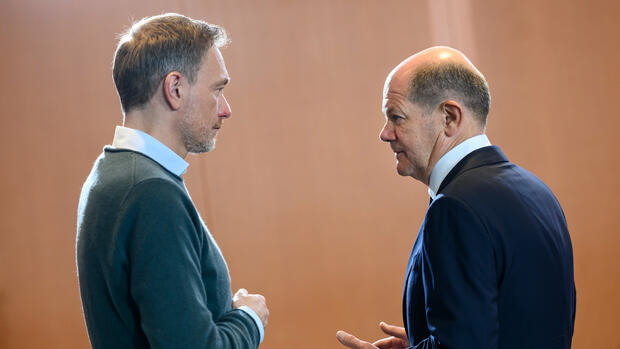Even the negotiating team of chancellor and finance minister has apparently not achieved any breakthroughs so far.
(Photo: dpa)
Berlin Despite the intervention of Chancellor Olaf Scholz (SPD), there is still no rapprochement in the federal government’s budget dispute. Even after talks with Scholz and Finance Minister Christian Lindner (FDP), ministries led by Green politicians refused to approve the austerity measures, the Handelsblatt learned from government circles.
A government representative familiar with the negotiations said that agreement was now reached with the departments led by the SPD and FDP. But: “The Greens are blocking themselves.” Scholz’s presence has not led to any movement so far.
Finance Minister Lindner sent letters to all ministries two weeks ago, in which he stipulates the maximum amount of money each department may spend in the coming year. The cuts vary from ministry to ministry. They should primarily affect the so-called disposable expenses, such as funding programs. Social expenses for which there are legal entitlements are excluded.
>> Read here: Lindner sends savings targets to all ministries
Lindner had agreed the specifications with Scholz and Vice Chancellor Robert Habeck (Greens). At the same time, a procedure was also agreed: If ministers do not accept the savings targets, they not only have to negotiate with Lindner as usual, but also with Scholz.
The chancellor’s participation in the talks is also a signal to the ministers: Scholz supports the budget cuts – softening is therefore hardly realistic.
Greens advocate tax increases instead of austerity plans
But despite Scholz’s support, the Greens are apparently not ready to support the savings. This makes it clear how big the differences in budgetary policy are now. The Greens reject the cuts and instead call for improving revenue through tax increases. The FDP, in turn, ruled this out – and is supported by the chancellor.
>> Read more: 20 billion gap in the budget – now the chancellor intervenes
In recent years, budget negotiations have been relatively easy because tax revenue has been rising steadily – and because the debt brake has been suspended. The finance minister insists that the debt brake should come into effect again in the coming year. At the same time, there is hardly any new leeway through tax revenues.
According to information from the Ministry of Finance, around 20 billion euros are missing from the budget. Accordingly, savings have to be made – although many ministries had actually aimed for significant increases in spending. This has been the cause of controversy for months now.
Who is particularly affected by the savings package
According to a report by “Spiegel”, Lindner wants to save a total of around 3.7 billion euros with the specifications for the ministries. Transport Minister Volker Wissing (FDP) has to make the largest contribution to savings with just over one billion euros, followed by Research Minister Bettina Stark-Watzinger (FDP) with 533 million euros.
Economics Minister and Vice Chancellor Robert Habeck (Greens) are to be allocated 387 million euros. Interior Minister Nancy Faeser (SPD) has to forego 378 million euros, Development Minister Svenja Schulze (SPD) 329 million euros. Foreign Minister Annalena Baerbock from the Greens has to make do with 189 million euros less.
Only Defense Minister Boris Pistorius (SPD) is exempt from the austerity package, he can even plan with more money. However, he is said to have been dissatisfied at first because he had bet on an even higher increase in spending.
The federal government wants to agree on the budget by the end of the month. At the beginning of July, the cabinet should then decide on the draft budget before the parliamentary summer recess begins.
More: The standstill coalition – with these projects, the traffic light blocks itself
